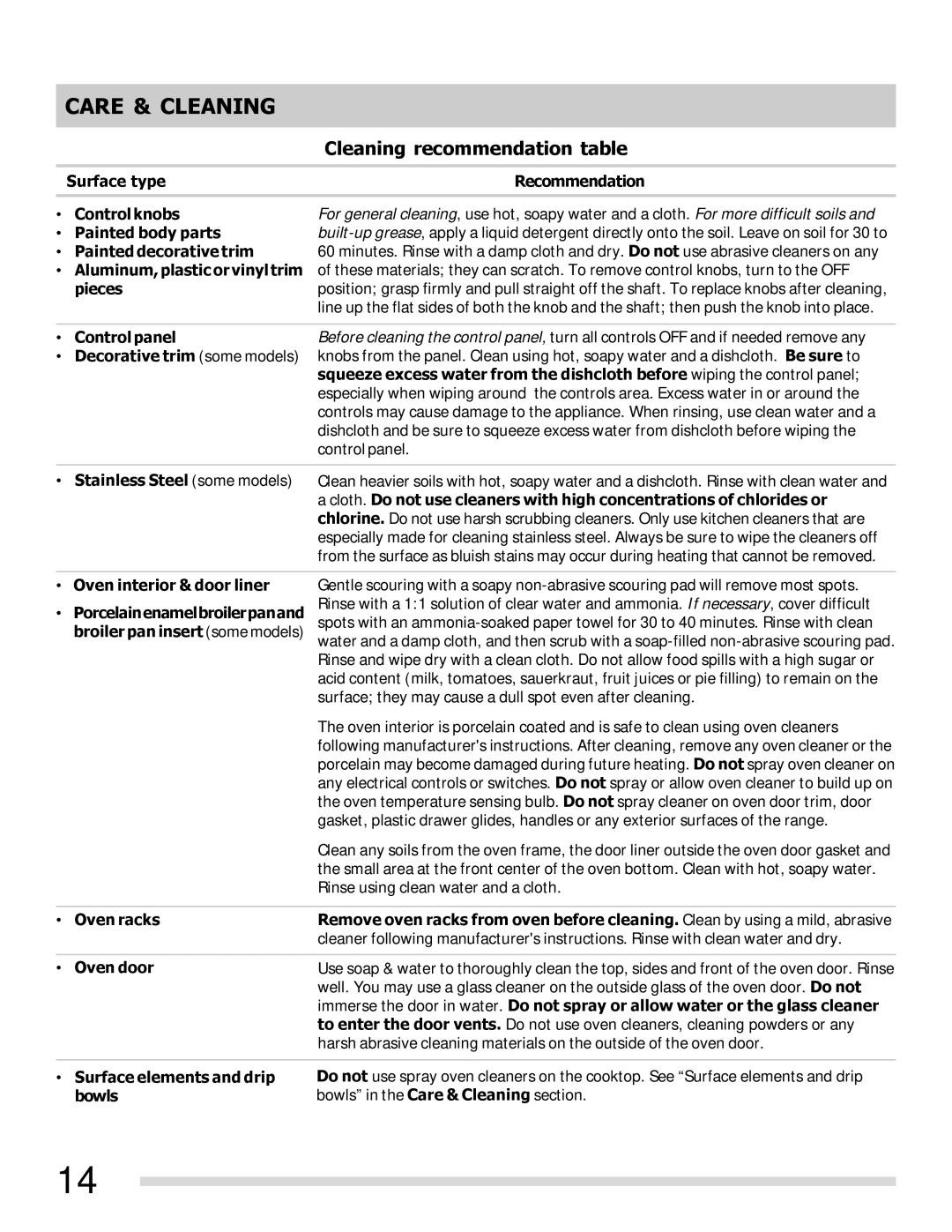
CARE & CLEANING
|
| Cleaning recommendation table |
|
|
|
| Surface type | Recommendation |
|
|
|
• | Control knobs | For general cleaning, use hot, soapy water and a cloth. For more difficult soils and |
• | Painted body parts | |
• | Painted decorative trim | 60 minutes. Rinse with a damp cloth and dry. Do not use abrasive cleaners on any |
• Aluminum, plastic or vinyl trim | of these materials; they can scratch. To remove control knobs, turn to the OFF | |
| pieces | position; grasp firmly and pull straight off the shaft. To replace knobs after cleaning, |
|
| line up the flat sides of both the knob and the shaft; then push the knob into place. |
|
|
|
• | Control panel | Before cleaning the control panel, turn all controls OFF and if needed remove any |
• Decorative trim (some models) | knobs from the panel. Clean using hot, soapy water and a dishcloth. Be sure to | |
|
| squeeze excess water from the dishcloth before wiping the control panel; |
|
| especially when wiping around the controls area. Excess water in or around the |
|
| controls may cause damage to the appliance. When rinsing, use clean water and a |
|
| dishcloth and be sure to squeeze excess water from dishcloth before wiping the |
|
| control panel. |
|
| |
• Stainless Steel (some models) | Clean heavier soils with hot, soapy water and a dishcloth. Rinse with clean water and | |
|
| a cloth. Do not use cleaners with high concentrations of chlorides or |
|
| chlorine. Do not use harsh scrubbing cleaners. Only use kitchen cleaners that are |
|
| especially made for cleaning stainless steel. Always be sure to wipe the cleaners off |
|
| from the surface as bluish stains may occur during heating that cannot be removed. |
|
| |
• Oven interior & door liner | Gentle scouring with a soapy | |
• Porcelainenamelbroilerpanand | Rinse with a 1:1 solution of clear water and ammonia. If necessary, cover difficult | |
| broiler pan insert (some models) | spots with an |
|
| water and a damp cloth, and then scrub with a |
|
| Rinse and wipe dry with a clean cloth. Do not allow food spills with a high sugar or |
|
| acid content (milk, tomatoes, sauerkraut, fruit juices or pie filling) to remain on the |
|
| surface; they may cause a dull spot even after cleaning. |
|
| The oven interior is porcelain coated and is safe to clean using oven cleaners |
|
| following manufacturer's instructions. After cleaning, remove any oven cleaner or the |
|
| porcelain may become damaged during future heating. Do not spray oven cleaner on |
|
| any electrical controls or switches. Do not spray or allow oven cleaner to build up on |
|
| the oven temperature sensing bulb. Do not spray cleaner on oven door trim, door |
|
| gasket, plastic drawer glides, handles or any exterior surfaces of the range. |
|
| Clean any soils from the oven frame, the door liner outside the oven door gasket and |
|
| the small area at the front center of the oven bottom. Clean with hot, soapy water. |
|
| Rinse using clean water and a cloth. |
|
|
|
• | Oven racks | Remove oven racks from oven before cleaning. Clean by using a mild, abrasive |
|
| cleaner following manufacturer's instructions. Rinse with clean water and dry. |
|
|
|
• | Oven door | Use soap & water to thoroughly clean the top, sides and front of the oven door. Rinse |
|
| well. You may use a glass cleaner on the outside glass of the oven door. Do not |
|
| immerse the door in water. Do not spray or allow water or the glass cleaner |
|
| to enter the door vents. Do not use oven cleaners, cleaning powders or any |
|
| harsh abrasive cleaning materials on the outside of the oven door. |
•Surface elements and drip bowls
Do not use spray oven cleaners on the cooktop. See “Surface elements and drip bowls” in the Care & Cleaning section.
14
